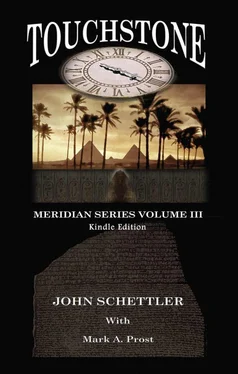“Who knows. Pushpoints are very fragile things.”
“But how could that have destroyed the Rosetta Stone? I just don’t see the connection.”
Paul was silent for a time. “Neither do I,” he said at last, his voice laden with an air of finality.
Nordhausen picked up on the tonal change at once. “You mean to say… you don’t think I’m responsible?”
“Nope.”
The professor sighed with great relief. “Thank God—but how can you be sure? You’re the one who says these little pushpins could be anywhere. Suppose I took someone’s seat at the opera, like you said, and they moved elsewhere.” He spun out a scenario, inwardly hoping he would not end up shifting the blame back on his own shoulders again. “So this guy moves and has a conversation with someone at his new seat—someone he was never supposed to meet, and the dislocation caused some sort of cascading event in the continuum. You follow me? Could that have caused the damage?”
“Yes, I follow you, and no, it could not.”
“How can you be certain?” The professor wanted to know if he was really off the hook.
“I’m certain. I thought this from the very first moment you came out with this.”
“What? And you kept it to yourself!”
“It’s elementary, my dear professor.” Paul smiled, pleased to be Holmes to Nordhausen’s Watson. “You say this artifact was discovered in 1799 by Napoleon’s troops?”
“Yes, at Rosetta. That’s how it got the name.”
“Fine. And what year was your breaching point set for?”
“1880. The year Pirates of Penzance opened at the Opera Comique in London.”
“So how does a contamination in 1880 cause damage to a stone carving that was discovered nearly a hundred years earlier?”
“Right…” Nordhausen groped about the argument, feeling he way forward. “The curator! When I saw the damage to the stone he claimed he had taken very good care of it—that it was always that way!”
“So the damage had to occur earlier on the Meridian.” Paul slowed the Honda to look for the entrance to the memorial grounds. Nordhausen leaned back, exhaling deeply.
“Thank God,” he breathed. “It wasn’t me. Why didn’t you tell me if you suspected this all along?”
“You needed to sit with it for a while,” Paul chided. “You ran off to Reading Station to retrieve Lawrence’s manuscript, then dragged me off to Wadi Rumm for a tour of the Crusades. Now this. I wanted you to stew in your own pot for a while, my friend.”
Nordhausen was going to say something, but he caught himself, nodding his head.
“I suppose I had it coming,” he agreed at last. “Yet I can’t tell you how relieved I am! I thought it was all my fault—the stone, the hieroglyphics, Kelly. All of it.”
“Well you can finally be done with that,” said Paul, “because I don’t think you had anything to do with Kelly’s situation either. We may find out your meddling caused changes in this Meridian, but we won’t know that until we get the Golem report. It’s a pretty fair bet that you didn’t damage this Rosetta Stone you keep talking about. Didn’t you hear me when I first came in? The initial reports showed a spatial locus in the Middle East—and you were in London.”
Robert gave him a wide eyed look. “Yes… Then I couldn’t be the one responsible for the contamination. But who then? How did it happen?”
“You should be.” There was an ominous tone to that, and Paul gave the professor a hard look.
“What now?” he asked.
“I think we both know who might be behind this business, Robert.”
“You mean Rasil and his confederates?”
“Possibly—in fact, very likely. There’s no doubt he learned of your phone call from the digital log on his gizmo. A simple number trace would give him Kelly’s cell phone number, and it would ID our good buddy clear enough. So, in one way, you still may be responsible for what’s happening to Kelly. Someone is on to us, and they’re trying to counter what we’ve been doing with the project.”
“Damn…” Nordhausen nodded his head gravely. “We have to find out what is going on… is that the place?” He pointed to a wrought iron gate up ahead, marking the entrance to the memorial site.
They passed a painted white sign blowing wildly in the rain: Eternal Grove Cemetery. They selected the spot when they thought Kelly was lost, burying a few mementoes in a shallow grave, on a isolated hillside still far from development, a peaceful oak grove surrounded by green pastureland and harboring a small cemetery. Now the oak trees were heaving furiously in the wind, bulging black shapes in the dark. A heavy chain bound the white painted gate, rattling with the wind. Nordhausen hopped out to open it, while Dorland drove on through.
Old oak leaves were blowing, stirred up by the storm. Nordhausen waved the car by, and secured the chain. They were very much alone, in fact they hadn’t seen another car for miles on the road, but Paul’s intimations had unnerved him. Thankfully, the rain was abating somewhat, and the professor ran down the drive after the white Honda, which finally came to a stop where the driveway opened on a pathway into the memorial grounds.
After the sharp crunching of tires on the gravel, the silence was acute. Spread before them in the moonlight was a rolling hillside graveyard of several acres, descending to a stream that wound away to the valley in the distance. The shadows of clouds raced across the headstones, making them flash when the moonlight suddenly bathed them again. Occasional optimistic frogs started to croak fitfully in the unseen distance.
Dorland got out, opened the trunk of the Honda and the two men pulled out a pair of shovels, a pick and a pry-bar wrapped in a blanket tied with bungee cords.
“Can you find it in this murk?” asked Nordhausen.
“It’s over here.”
He started down the left arm of the loop with a shovel in his hand, his lanky frame bent forward against a gust of wind. Nordhausen followed with the other shovel and the tools.
They heard a car approach on the main road and stopped walking, their hackles raised with alarm. It was just a passing vehicle, but it was clear that they both were quite on edge.
“Good thing the moon’s out.” said Nordhausen.
“If only it weren’t raining,” Paul complained. Dorland was looking around for landmarks. He located a familiar stone, a fine marble urn with cherubs, 1807 – 1879, Matilda Hibbard, Beloved Wife and Mother. The rain was short and brisk, the tail end of a squall. It had darkened the granite headstones, and made the polished marble gleam. He walked around a few tilted headstones, and found Kelly’s, a modest plaque set flat against the ground.
Behind the plaque, the sod was humped up, and had fresh cuts around the edges. The ground bore the unmistakable mark of tampering.
“This has been opened.” said Nordhausen.
“It sure looks like it. Probably within the last couple days, possibly even hours.”
The two men looked at each other, wondering if they should go ahead and do what they had come to do in the first place.
“Well, we have to know,” said Paul. “That’s the whole point of a Schroedinger’s box. You make your reality when you look inside. Let’s dig.”
He waded in with a strong foot on his shovel, and heaved away the first clod. They wedged the memorial plaque aside and for the next ten minutes the two men delved into the shallow grave. At first the work was muddy, but soon they hit dry earth. The expected thud came suddenly when the professor’s shovel hit something hard.
“There’s our Schroedinger’s box,” said Paul. Without speaking, they cleared off the last of the dirt.
Читать дальше












